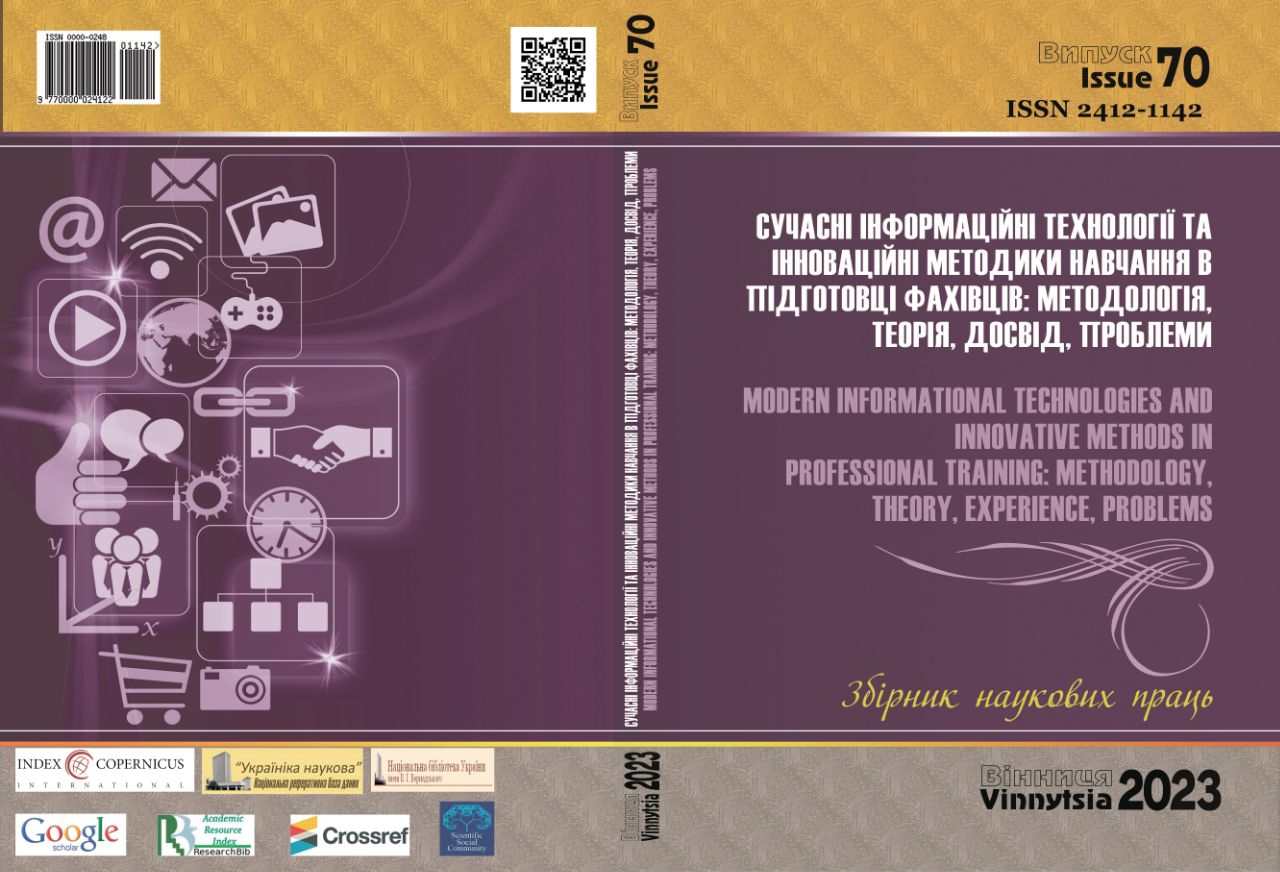THE STAGES OF IMPLEMENTATION OF THE TEACHER'S DIGITAL COMPETENCESELF-ASSESSMENT TOOL IN THE CONTEXT OF PROFESSIONAL DEVELOPMENT
DOI:
https://doi.org/10.31652/2412-1142-2023-70-57-65Keywords:
digital technologies; self-assessment tool; digital competence; teacher; professional developmentAbstract
The article highlights the development and steps of implementing a tool for self-assessment of digital competence of a teacher based on the experience of domestic specialists in the period of 2020- 2023. An analysis of approaches to the development of a self-assessment tool in the international educational community is carried out. Approaches to compiling a survey questionnaire based on the Digital Competence Framework for Educators (DigComp 2.1) are substantiated. The stages of development of a self-assessment tool for the teacher's digital competence are presented: development, improvement, implementation. The procedure for conducting the survey over four years is described. A block diagram of the creation and implementation of a teacher's digital competence self-assessment tool is presented. The principles that contributed to obtaining reliable data during the self-assessment of a teacher's digital competence are substantiated and presented. It is proved that the self-assessment tool of the teacher's digital competence should contain elements of identifying the degree of readiness to use ICT by teachers and educational institutions, which contributes to the development of recommendations and finding solutions to overcome existing problems. The concept of the readiness of teachers to use the tools of the information and educational environment for the implementation of educational activities in quarantine conditions is defined. The main indicators obtained during the all-Ukrainian survey of teachers in the system of general secondary education were analyzed, and the dynamics of the development of digital competence of teachers were revealed. The main content of methodological recommendations for postgraduate education, developed on the basis of the approbation of the self-assessment tool, is presented. The scientific novelty of the presented research lies in the discovery of new approaches, the development of principles and forms of self-assessment of the teacher's digital competence in the conditions of restrictions caused by the long quarantine and wartime in the country. The conclusions regarding the further use of the teacher's digital competence self-assessment tool in the system of postgraduate pedagogical education are substantiated. Prospects for further research are outlined.
Downloads
References
Іванюк, І.В., Овчарук, О.В. (2020). Результати онлайн опитування щодо потреб вчителів у підвищенні фахового рівня з питань використання цифрових засобів та ІКТ в умовах карантину. Аналітичні матеріали. Інститут інформаційних технологій і засобів навчання НАПН України. URL: https://lib.iitta.gov.ua/719908/
Морзе, Н. В., Воротникова І.П. Модель ІКТ компетентності вчителів. https://doi.org/10.15587/2519- 4984.2016.80644
Овчарук, О.В. Іванюк, І.В. (2020) Стан готовності педагогів до використання інструментів інформаційноосвітнього середовища для здійснення дистанційного навчання в умовах карантину, спричиненого COVID-19 Нова педагогічна думка, 3 (103). стор. 48-54. URL: https://lib.iitta.gov.ua/722626/
Постанова Кабінету Міністрів України № 211 від 11 березня 2020 р. «Про запобігання поширенню на території України коронавірусу COVID-19». URL: https://zakon.rada.gov.ua/laws/show/211-2020- %D0%BF#Text
Результати онлайн-опитування «Готовність і потреби вчителів щодо використання цифрових засобів та ІКТ в умовах війни: 2023». Аналітичний звіт/ О.Овчарук, І.Іванюк, О.Гриценчук та ін..; за заг.ред. О.Овчарук. – Київ : ІЦО НАПН України. 2023. – 81 с. URL: https://lib.iitta.gov.ua/736435/
Цифрова компетентність вчителя: інструмент самооцінювання та особливості використання: методичні рекомендації: В.Ю.Биков, О.О.Гриценчук, О.А.Дубовик, Ю.І.Завалевський, І.В.Іванюк, О.Є.Кравчина, О.В.Овчарук,.. – К. : ІЦО НАПН України – 2022. URL: https://lib.iitta.gov.ua/730497/
Teachers` competences evaluation: Case study. Available from: https://www.researchgate.net/publication/342580412_Teachers_competences_evaluation_Case_study accessed Aug 26 2023..
Punie, Y., editor(s), Redecker, C. (2017). European Framework for the Digital Competence of Educators: DigCompEdu , EUR 28775 EN, Publications Office of the European Union, Luxembourg. DOI: 10.2760/159770.
Mishra, P., & Koehler, M. J. (2006). Technological pedagogical content knowledge: A framework for teacher knowledge. Teachers College Record, 108(6), 1017–1054. https://doi.org/10.1111/j.1467-9620.2006.00684.x
Pérez-Navío, E., Ocaña-Moral, M. T., & Martínez-Serrano, M. D. C. (2021). University graduate students and digital competence: Are future secondary school teachers digitally competent? Sustainability, 13(15), 1–14. https://doi.org/10.3390/su13158519
UNESCO ICT Competency Framework for Teachers (2018). 7, place de Fontenoy, 75352 Paris 07 SP, France. https://unesdoc.unesco.org/ark:/48223/pf0000265721
Babu, S., and Mendro, R. (2003). Teacher Accountability: HLM-Based Teacher Effectiveness Indices in the Investigation of Teacher Effects on Student Achievement in a State Assessment Program presented at the Annual Meeting of AERA, (Chicago, IL., April, 2003).
Tzafilkou, K., Perifanou, M. & Economides, A.A. Assessing teachers’ digital competence in primary and secondary education: Applying a new instrument to integrate pedagogical and professional elements for digital education. Educ Inf Technol (2023). https://doi.org/10.1007/s10639-023-11848-9
Stephanie Carretero, Riina Vuorikari, YvesPunie. DigComp 2.1: The Digital Competence Framework fo rCitizens with eight proficiency levels and examples of use.- Luxembourg: Publications Office of the European Union, 2017.– 48 р.
Downloads
Published
Issue
Section
License
Copyright (c) 2023 Овчарук Оксана Василівна

This work is licensed under a Creative Commons Attribution 4.0 International License.

